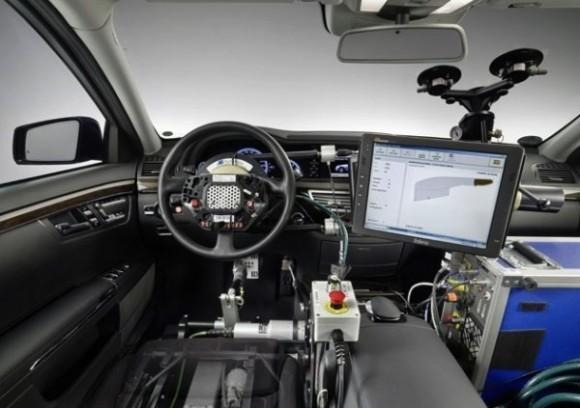Self-Driving Cars Might Demand New License Tests For Drivers
Owners of self-driving cars may have to undergo extra testing in order to "upgrade" their license to handle the next-gen vehicles, the NHTSA has suggested. Tentative enthusiasm for self-driving cars by the US National Highway Traffic Safety Administration comes with the possibility of more stringent drivers license testing, with the new challenges of safely interacting with autopilot systems deemed sufficiently novel that the existing test would be insufficient.
Advocates of self-driving technology, such as is being tested by Google among others, welcomed the NHTSA's new public stance on automated vehicles, announced this week. The government agency set out five levels of potential autonomy, ranging from fully manually operated cars as are on the road today, dubbed "Level 0", through to models that can handle the entire trip with no more human interaction than setting the required destination.
Such "Level 4" vehicles aren't yet in testing, the NHTSA points out, with cars like Google's test fleet falling into "Level 3" where a driver might be called upon to take over should the autopilot deem itself insufficiently capable to handle the current road conditions.
It's that potential to be summoned back into the driver's seat that has the NHTSA concerned, however, with suggestions that while the technological aspect of such cars is being heavily researched, the human factors are still poorly understood. That could include how a human driver monitors the performance of the autopilot, so as to ensure any problems are quickly spotted, and the transition between self-driving and regular modes.

The NHTSA has begun the evaluation process to address these questions and more, which is expected to be completed – in its first phase, at least – within the next two years. "One of the main end products of this initial research program would be recommendations for what requirements are needed for the driver-vehicle interface," the NHTSA says, "to allow safe operation and transition between automated and non-automated vehicle operation."
However, the agency is already making one recommendation, which is that drivers in the few states where self-driving cars are already permitted for real-world testing should add in an extra endorsement – if not an entirely separate license – to authorize them to get behind the semi-autonomous wheel. That testing process should include a minimum number of hours in a self-driving car, as well as having received instruction from the vehicle's manufacturer as to how it works and how to safely operate it.
"The training course should be submitted to the state agency that issues driving licenses for approval prior to the taking of that course by any person seeking a driver's license endorsement certification. The course should include providing an understanding of the basic operation and limits of self-driving vehicles, and knowledge of how to resume control of such a vehicle in the event that it cannot continue to operate automatically" NHTSA
The suggestions in the Agency's policy document are all voluntary at this stage, and it's early days for any actual laws – or even proposed laws – to emerge. Nonetheless, it looks likely that as we wait for "Level 4" cars to arrive, there'll be some extra requirement on top of current licensing procedures for drivers to undertake, given the new and unusual ways that self-driving cars will interact with those behind the wheel.
VIA: WSJ
